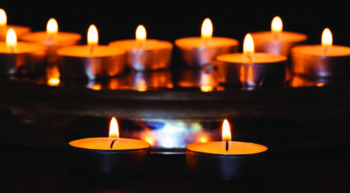Suicide – Seven Ways to Help Grievers

By Victor M
Parachin
When Kristen Clifford's husband - Steven Clifford, a police officer - wasn't responding to her text messages, she became alarmed and drove home, where she found notes, his police identification, his driver's licence. "Everything laid out very neatly, methodically", she recalled. Frightened, she rushed down the hallway to their bedroom, discovering the door closed and another note stating: "I did it. Do not enter. Call 911". Her 35 year-old husband ended his life by suicide.
Some Suicide Statistics |
|
New Zealand
Source: Stuff, 26 August 2019 |
Australia
Sources: Life in Mind and Suicide Call Back Service Australia |
United States
Source: American Foundation for Suicide Prevention |
International
|
Furthermore, it has been estimated that every suicide death leaves behind six or more ‘suicide survivors’ -- family members and friends who are left grieving and struggling to understand.
 Here are seven ways to help those grieving a suicide death:
Here are seven ways to help those grieving a suicide death:
1. Be there
Show up and let them know that you care. "Comfort my people, says your God", is the instruction from the prophet Isaiah (40:1, New International Version). Although the stigma attached to suicide is softening, survivors continue to feel blemished and isolated. That's why it's important to make your presence felt as soon as you learn a family member or friend has experienced a suicide death. If you are geographically distant, call, text or send an email of support. If you are local, then simply be there -- at the home, at the funeral service.
A wife grieving her husband’s death by suicide said that "the people who were most helpful to me could be in my presence and tolerate my pain and didn't have to say anything. There are no right words really, but it was comforting to have someone who can be with you with that much pain".
2. Be there to listen
 Plan to listen far more than you speak. Any questions you ask should be for purposes of clarification and not intrusive or invasive. Rabbi Earl Grollman, author of Suicide: Prevention; Intervention; Postvention, states: "Bereaved people need to express their emotions. They can be encouraged to talk when others say ‘What are you feeling? .... Tell me what is happening with you. ... It must be very hard on you’. Friends should focus on where they are. Accept their moods, whether they reflect fear or rage or panic. Friends are not there to judge but to listen”.
Plan to listen far more than you speak. Any questions you ask should be for purposes of clarification and not intrusive or invasive. Rabbi Earl Grollman, author of Suicide: Prevention; Intervention; Postvention, states: "Bereaved people need to express their emotions. They can be encouraged to talk when others say ‘What are you feeling? .... Tell me what is happening with you. ... It must be very hard on you’. Friends should focus on where they are. Accept their moods, whether they reflect fear or rage or panic. Friends are not there to judge but to listen”.
3. Know what to say and what not to say
Be guided by this biblical wisdom: "Gracious words are a honeycomb, sweet to the soul and healing to the bones" (Proverbs 16:24). Keep in mind that suicide grievers are struggling with a wide variety of confusing and conflicting emotions such as anger, guilt, regret, shock, denial, emptiness. Avoid adding to their pain by making trite clichés and meaningless platitudes, no matter how well-intentioned they may be. Here are some things not to say:
- I know how your feel
- This too shall pass
- You will find a way to cope
- It's time to move on
- At least he / she is no longer in pain
- Don't cry. He / she wouldn't want that
 And, here are some comments which suicide grievers do find helpful. Use these:
And, here are some comments which suicide grievers do find helpful. Use these:
- I am sorry
- Just know that I care
- We all need help at times like this; I'm here for you
- I don't know how you feel, but I want to help in any way I can
- I am here for you; I have an open heart and time to listen
- I will stand with you through this time
When reaching out to a suicide griever choose your words carefully so that they heal rather than hurt. Tracy Roberts, a writer who lost her sister to suicide, cited an example of hurtful words in her essay Suicide Etiquette: After Amy Killed Herself. She recalled that “someone said, by way of comforting me, ‘Suicide is the coward’s way out’. Besides being an inane truism, this pronouncement indicted the sister I was mourning. How was that supposed to console?”
Consider also this insight from Gayle Brandeis, The Art of Misdiagnosis: Surviving My Mother’s Suicide: "While it can be tricky to know what to say to a suicide loss survivor, it is much better to reach out than to hold back out of fear of saying the wrong thing. A simple note, a simple gesture, can make a huge difference. “It was not your fault” is something many suicide loss survivors need to hear over and over and over again, as is “You are not alone”.”
4. Understand that suicide grief is different from other grieving
While there are many common elements of grief after a loved one has died, suicide grieving has additional and different components adding complexity to the grief process. These are the four main challenges:
- First, there is the suddenness of the death. Suicide is often unexpected, leaving no space to say goodbye or to resolve any lingering issues.
- Secondly, there is the anguishing question of "why"? Survivors exhibit a frantic need to know why the suicide happened. There can be a desperate and relentless search for clues before there is recognition that one may never know why or fully understand the act.
- Thirdly, there can be acute guilt which is self-assigned. Both family members and friends experience intense guilt driven by "if only" thoughts -- if only I had noticed; if only I hadn't said that; if only I had said that; if only I had been home, etc. Supporters can try to gently guide grievers to recognise that they are not responsible for the person's decision to end his or her life.
- Fourthly, there is the social stigma attached to a suicide. This can be seen by the simple fact that, until recently, a suicide act was considered a crime in many countries, or a spiritual ‘unforgivable sin’. Also, the phrase ‘commit suicide’ is a legally pejorative one, similar to ‘commit murder’ or ‘commit a crime’. Suicide survivors have to deal with a long history of stereotyping, mistrust, judgment, blaming and avoidance.
5. Recommend a suicide survivor support group
 According to the newsletter, Harvard Women's Health Watch, research indicates that survivors find suicide support groups to be powerful and therapeutic. "There are many general grief support groups, but those focused on suicide appear to be much more valuable … [and] every survivor who had the opportunity to talk one-on-one with another suicide survivor found it beneficial". You can help a survivor by researching out a suicide support group in your area, providing the information, recommending participation and offering to attend a few sessions with the griever.
According to the newsletter, Harvard Women's Health Watch, research indicates that survivors find suicide support groups to be powerful and therapeutic. "There are many general grief support groups, but those focused on suicide appear to be much more valuable … [and] every survivor who had the opportunity to talk one-on-one with another suicide survivor found it beneficial". You can help a survivor by researching out a suicide support group in your area, providing the information, recommending participation and offering to attend a few sessions with the griever.
6. Remember survivors on special days
Grief can be triggered intensely throughout the year on special days: December holidays, thanksgiving, the New Year, Valentine's Day, Father's Day, Mother's Day, as well as birthdays, anniversaries, and graduations. These days constitute some of the roughest terrain which survivors have to travel through. Remember to reach out on these days. Even a simple text, email or mailed card can go a long way towards lifting some of the anxiety and stress survivors feel on special days. On the death date of a person's suicide, consider lighting a candle and sending an email to the survivor for whom the loss is most painful, saying something like this: "I know today may be a hard day for you so I am lighting a candle of hope, remembrance and support for you".
7. Pro-rate your support
 Be there for the long haul, for the entire journey through grief. Rabbi Grollman says: "The survivor-victims often need to talk about their loved one for months and years -- not for just a few days following the funeral. Healing is a long, long process. Friends need to continue to call and visit. Survivor-victims desperately need continuing love, support and concern."
Be there for the long haul, for the entire journey through grief. Rabbi Grollman says: "The survivor-victims often need to talk about their loved one for months and years -- not for just a few days following the funeral. Healing is a long, long process. Friends need to continue to call and visit. Survivor-victims desperately need continuing love, support and concern."
By extending support, sympathy and understanding to those who grieve, you will help suicide grievers know that it is possible to experience living while grieving. You, as a compassionate friend, will be a lifeline for suicide survivors, providing them stability and strength for their challenge.
 Entries(RSS)
Entries(RSS)